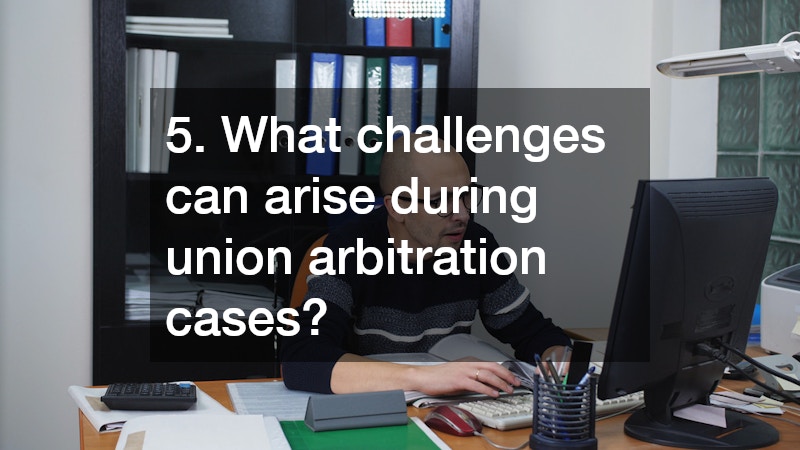Union arbitration cases play a critical role in resolving disputes between unions and employers. This article addresses the most frequently asked questions regarding the process, implications, and challenges of union arbitration.
1. What is union arbitration, and why is it used?
Understanding Union Arbitration
Union arbitration is a form of alternative dispute resolution specifically designed for labor-related conflicts. It serves as a formal process where an impartial third party, known as an arbitrator, is appointed to review the case and make a binding decision.
The primary purpose of union arbitration is to provide a fair and efficient means of resolving disputes outside the court system. This approach reduces the time, expense, and adversarial nature often associated with litigation.
Arbitration processes are streamlined, which allows for quicker resolutions compared to traditional litigation. Furthermore, the binding nature of most arbitration decisions ensures compliance and finality.
The Importance of Arbitration in Labor Relations
Arbitration is valued for its ability to maintain industrial peace and prevent strikes and lockouts. By providing a predictable structure for conflict resolution, it mitigates disruptions in the workplace.
Unlike litigation, arbitration tends to be less confrontational and more focused on collaborative problem-solving. For employers and unions alike, this fosters a more constructive relationship post-dispute resolution.
The confidential nature of arbitration proceedings is also advantageous, as it helps preserve reputations and the confidentiality of sensitive company and union information during the dispute process.
2. How is an arbitrator selected in union arbitration cases?
Criteria for Selecting an Arbitrator
Choosing an appropriate arbitrator is crucial, and several factors are taken into consideration during this selection. Experience in labor relations, neutrality, and a solid reputation often top the list.
In many cases, the arbitrator is jointly selected by both the union and the employer to ensure fairness. Professional credentials and a record of impartiality are key in vetting potential candidates.
Additionally, both parties may prefer arbitrators who have specialized knowledge related to the industrial sector involved in the dispute. This expertise enables the arbitrator to make more informed decisions.
The Process of Arbitrator Selection
Typically, the process begins with the union and employer exchanging lists of potential arbitrators, facilitated by their respective legal or representation teams. They may also turn to arbitration institutions for guidance.
If parties cannot agree on a single arbitrator from the lists, they might opt for a panel or allow an arbitration institution to appoint one. This process ensures neutrality and credibility in the selection.
Once an arbitrator is agreed upon, both parties formally appoint the individual or panel, moving forward with the arbitration proceedings. This collaborative approach underscores the essence of fair arbitration.
3. What are the typical stages of a union arbitration process?
Pre-Arbitration: Preparation and Filing
The pre-arbitration stage primarily involves the preparation of the case, which includes gathering evidence and identifying witnesses. This stage is critical as it sets the groundwork for a compelling presentation during the hearing.
Filing a grievance formally initiates the arbitration process. The grievance outlines the issues at hand and establishes the foundation for the arbitrator’s review and decision-making.
In many instances, preliminary hearings are conducted to address procedural concerns or clarify issues before the main hearing. Such hearings help streamline the arbitration process by resolving preliminary disputes.
The Arbitration Hearing and Post-Hearing Phase
During the hearing phase, both parties present evidence, call witnesses, and make arguments to support their positions. This stage mimics a court trial but is generally less formal.
Following the hearing, the arbitrator reviews all evidence and arguments presented to issue an arbitration award. The post-hearing phase may involve post-hearing briefs or submissions to clarify specific points.
Once the award is made, it is typically binding, meaning both parties must adhere to the arbitrator’s decision. In some cases, post-arbitration remedies may be pursued if one party believes there has been an error or misconduct.
4. What are the common outcomes of union arbitration cases?
Types of Arbitration Awards
Arbitration awards vary in nature, with the most common being binding awards that are final and enforceable. Non-binding awards serve as recommendations without legal enforcement, but they can guide further negotiations.
Some arbitration hearings conclude with consent awards, where the outcome reflects an agreement reached by both parties during the arbitration process. This often results in a mutually satisfactory resolution.
In rare cases, interim awards are issued to address urgent matters that arise during the arbitration process. These awards provide temporary relief pending the final decision.
Impact of Arbitration Outcomes on Labor Relations
The outcome of an arbitration case can significantly impact labor relations, setting precedents for future interactions between the union and employer. A fair outcome fosters trust and collaboration.
Conversely, an unfavorable or perceived biased award may strain relations, potentially leading to further disputes. Therefore, the transparency and fairness of the process are paramount.
Effective implementation of arbitration decisions is crucial to maintaining a healthy working relationship, as compliance signals respect for the established dispute resolution framework.
5. What challenges can arise during union arbitration cases?
Potential Roadblocks in the Arbitration Process
Delays are not uncommon in arbitration proceedings, often arising from scheduling conflicts or the complexity of the case. Such delays can prolong the dispute resolution process, affecting all involved.
The unavailability of key witnesses can hinder the ability to present a comprehensive case, impacting the quality of evidence and testimony provided to the arbitrator.
Overcoming Challenges in Union Arbitration
To address delays, parties might agree to expedited procedures or utilize technological solutions such as virtual hearings to streamline the process. Proactive case management can mitigate potential setbacks.
Ensuring witness availability can be managed through effective scheduling and communication, as well as employing alternative means such as depositions or affidavits if necessary. Preparation is key.




